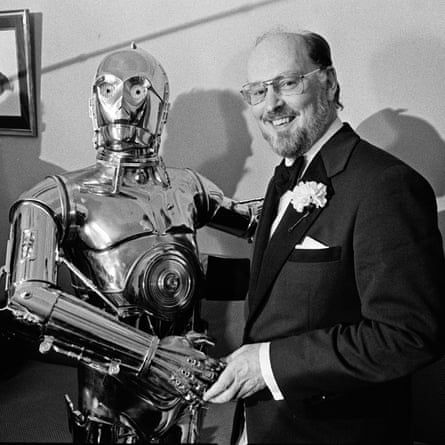Of all the gin joints in all the galaxy, Luke Skywalker walked into Mos Eisley Cantina. A wretched hive of villainy where your pint of blue milk might get spilled by some unfriendly bum-faced alien, the tavern is seared into the memory of nearly every sci-fi fan alive thanks to its appearance in 1977’s Star Wars: A New Hope.
But what Mos Eisley lacked in charm it more than made up for in live entertainment, being the regular gig of Figrin D’an and the Modal Nodes, perhaps better known simply as the Cantina band – the lobster-looking musicians whose bizarre interstellar take on Dixieland jazz, perhaps unwisely termed “jizz”, is currently enjoying a return to the zeitgeist as an influence on Björk’s new album, Fossora.
“Björk explained to us the conceptual elements and world-building behind the album when she invited us to make beats for her,” explains Atli Finnsson of electronic trio sideproject. Björk approached the group, members of grassroots Reykjavik art collective Post-Dreifing, at one of their shows. They bonded over a shared love of avant-garde electronica, and she sketched out her intentions for Ovule, the track they would collaborate on.
“She explained where the song was set in her mind – some obscure Finnish jazz bar that exists in the future” says sideproject member Örlygur Steinar Arnalds. “She said, it should sound like the Cantina band. So we tried for a jazzy, futuristic beat.”
Jazzy and futuristic were composer John Williams’ guiding principles when he wrote the two original pieces performed by the Modal Nodes in the movie. His Oscar-winning score for Star Wars took “19th-century romantic, symphonic” music as its inspiration: Writer/director George Lucas “didn’t want electronic or concrete music”, Williams wrote in the sleevenotes for the film’s soundtrack. “He felt the music should be on a fairly familiar emotional level.” But for the only diegetic music in the original movie, Lucas wanted Williams to conjure something alien.
“I didn’t have any idea what the sound should be,” Williams told Film Score Monthly in 1997. Lucas suggested Williams imagine aliens having somehow discovered sheet music written by 1930s swing legend Benny Goodman, and attempting to play it without any understanding of what Earth music sounded like. Williams returned to his piano and cooked up “the silliest little series of old-time swing band licks”, arranging the pieces for “Trinidad steel drums and out-of-tune kazoos”. The only electronic instrumentation was the ARP synthesiser, which delivered a fleet-footed bass line; filters and reverb were used to make the tracks sound more unearthly.
Williams called the cantina music “an anomaly”, but it captured cinemagoers’ imaginations, not least because the Mos Eisley scene – with D’an and his Modal Nodes played by the movie’s makeup artists, struggling to breathe in their rubber masks – was so memorable.
Domenico Monardo, aka Meco, a musician and sci-fi nut who saw the movie on its opening night, recorded a disco version of the Star Wars theme, making sure to include a minute-long detour into the cantina music. His medley, Star Wars Theme/Cantina Band, topped the US charts in 1977, shifting more than 2 million copies – twice what the actual soundtrack album sold. It remains the bestselling instrumental single in US history.

The Cantina band has remained a beloved element of the ever-growing Star Wars universe. Spin-off books and comics have sketched in backstories for the Modal Nodes – Figrin D’an has a gambling problem and, not coincidentally, is pals with Lando Calrissian.
The Cantina band itself, meanwhile, has been cited as an influence by artists as diverse as Coldplay – whose rewatch of the cantina band scene Chris Martin said prompted the band to wonder “what musicians are like across the universe” and inspired their 2021 album Music of the Spheres – and Animal Collective, who said the track was one of their inspirations on 2012’s Centipede Hz.
It’s been the subject of dozens of cover versions, rendered in ragtime, bluegrass, heavy metal and a cappella. Northern-Irish rockers Ash covered it for the B-side to 1995 single Girl From Mars. “Our producer walked out of the session – it was like the last straw,” remembers singer/guitarist Tim Wheeler. “We loved Star Wars – our bassist, Mark, had a near-complete collection of the action figures – and we’d just got the box set of the soundtracks. I figured the song out by listening to the CD with my guitar in my hand, note-by-note – and it has so many notes!”
The twentysomethings of sideproject say they knew the Cantina band from “playing the Lego Star Wars video game a million times” as kids. “For our generation, it’s a very meme’d piece of music”, adds Finnsson. But it wasn’t the sound of the Cantina band that made the biggest impression on their contribution to Fossora – indeed, Finnsson says it’s jarring to watch the movie now and see that “the cantina band are playing these weird, alien instruments, but the sounds are so normal” – so much as the creative exercise prompted by Björk’s direction.
“That conversation with her was really inspirational, imagining music in another world. Like, what would music sound like without any contact with jazz?” says Arnalds. “It’s been a reference point for our work ever since – writing music for some other place, imagining a world where music would sound like the music we make. And Star Wars is a great starting point for that.”

